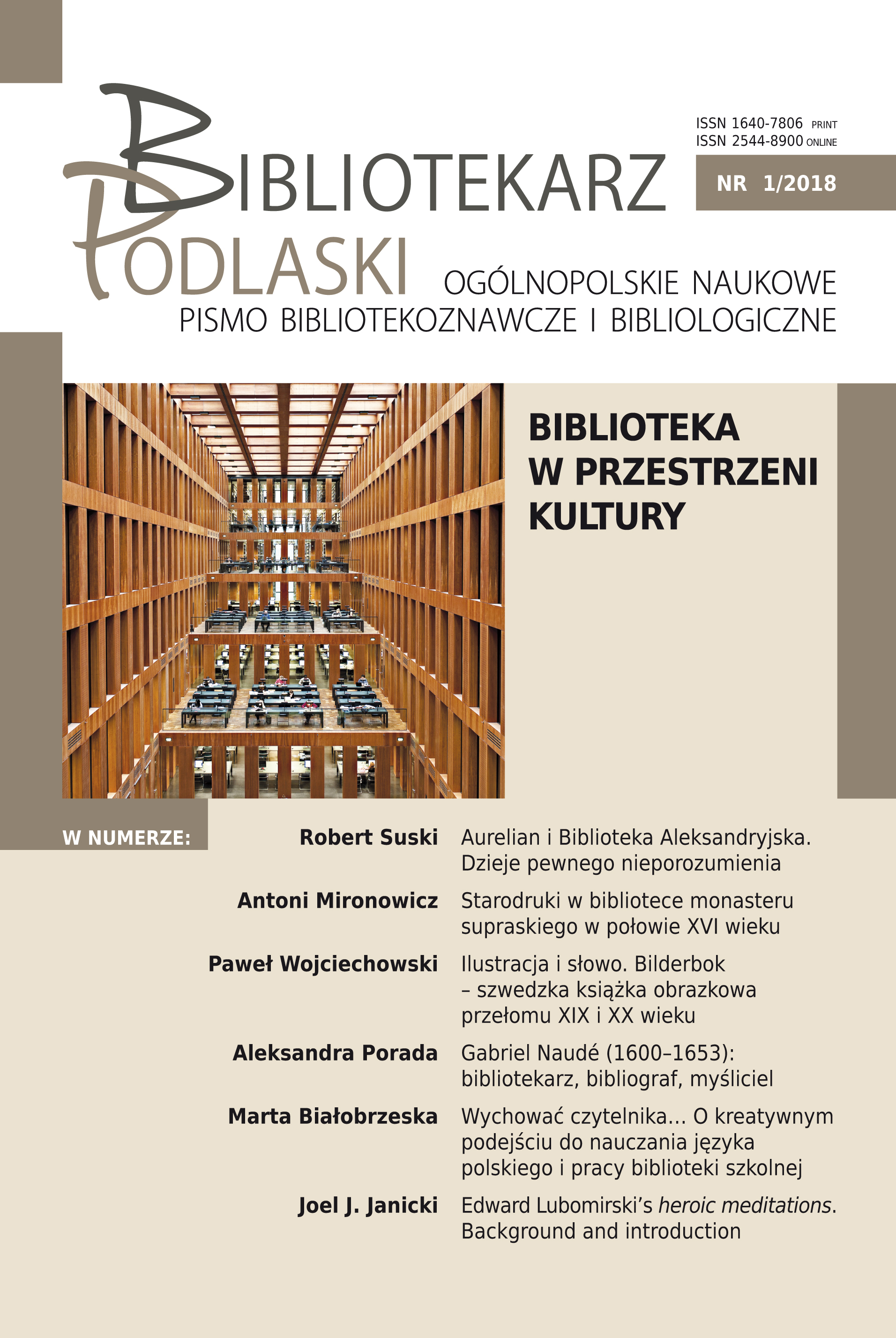Abstract
From its founding to the year 1783, the borders of the Diocese of Vilnius had been virtually untouched and it was the diocese with the largest territory in Europe. It’s size had been 226000 square kilometres, almost 8 times the average for a parish in the First Polish Republic. On the 9th of February 1782, the bishop of Vilnius Ignacy Jakub Massalski ordered a thorough inventory of all deaneries in his diocese. Visitations allowed for making reports on condition of the manses, churches, buildings belonging to the parish, hospitals, schools and parish libraries. Records concerning church inspections had been drafted from 1782 to 1784. This article presents the library inventory of selected parishes of the Diocese of Vilnius. Analysed publications, more or less known, have been divided into thematic categories: religious guides and theological tractates. Contents of these collections are invaluable in studying worldview and education of clergy working in a given parish.
References
Abramowicz L, Cztery wieki drukarstwa w Wilnie, Wilno 1925.
Bieńkowska B., Chamerska H., Zarys dziejów książki, Warszawa 1987.
Biernacka A., Dubiński M., Zarys historii bibliotek parafialnych w Polsce, ABMK, 73(2000).
Dahl S., Dzieje książki, Wrocław 1965.
Dyl J., Katalog druków teologicznych wytłoczonych w oficynach polskich w latach 1475–1550, ABMK, 76(2002).
Jurginis J, Odrodzenie i humanizm na Litwie, Wilno 1965.
Jurginis J., Pierwsze przekłady książek polskich na język litewski i ich znaczenie kulturalne, [w]: Dawna książka i kultura. Materiały z międzynarodowej sesji naukowej z okazji pięćsetlecia sztuki drukarskiej w Polsce, pod red. S. Grzeszczuka, A. Kaweckiej Gryczowej, Warszawa 1975.
Korsakas K., Pierwsza książka litewska, [w:] Sanoji lietuviška knyga, Kowno 1947.
Kurczewski J., Biskupstwo wileńskie od jego założenia aż do dni obecnych, Wilno 1912.
Litak S., Akta wizytacyjne parafii z XVI–XVIII wieku jako źródło historyczne, „Zeszyty Naukowe KUL”, R. 5, 1962, nr 3.
Litak S., Kościół łaciński w Rzeczypospolitej około 1772 roku, Lublin 2004.
Litak S., Od Reformacji do Oświecenia, kościół katolicki w Polsce nowożytnej, Lublin 1994.
Litak S., Parafie w Rzeczypospolitej w XVI–XVIII wieku, Lublin 2004.
Litak S., Struktura i funkcje parafii w Polsce, w: Kościół w Polsce, t. 2, pod red. J. Kłoczowskiego, Warszawa 1969.
Litak S., W sprawie publikowania i rejestracji akt wizytacyjnych kościołów i parafii, ABMK, 14(1967).
Ochmański J., Biskupstwo wileńskie w średniowieczu. Ustrój i uposażenie, Poznań 1972.
Pacevičius A., Biblioteki klasztorne na Litwie w końcu XVIII i pierwszej połowie XIX wieku: stan – rozwój – losy, [w:] Zakony i klasztory w Europie Środkowo-Wschodniej X–XX wiek, pod red. H. Gapskiego, J. Kłoczowskiego, Lublin 1999.
Topolska B. M., Czytelnik i książka w Wielkim Księstwie Litewskim w dobie Renesansu i Baroku, Wrocław 1984.
Szady J., Księgozbiory parafialne w prepozyturze wiślickiej w II połowie XVIII wieku, Lublin 2008.
Szwejkowska H., Książka drukowana XV-XVIII wieku. Zarys historyczny, Warszawa 1961.
Zahajkiewicz M., Funkcje i znaczenie biblioteki parafialnej lub klasztornej, ABMK, 77(2002).
Zahajkiewicz M., Miejsce bibliotek kościelnych w kulturze i rozwoju nauki, ABMK, 65(1996).
Zahajkiewicz M., Zarys dziejów i znaczenie bibliotek kościelnych, ABMK, 56(1988).
Articles published in the “gold open access” mode on the basis of a non-exclusive license agreement between the publisher and the author. Permitted use:
- the publication may be read and stored on any device,
- the publication may be cited (with obligatory reference to the author, the title of the text, as well as the full title, bibliographic address of the issue and page of the journal)
The editorial team of “Bibliotekarz Podlaski” implements an open access policy by publishing materials in the form of the so-called Gold Open Access. From volume 42 (issue 1/2019), the journal is available under the Creative Commons license (Attribution – ShareAlike: CC BY-SA).
The key declarations of the Open Access and Open Science movement, which we fully support, are available on the CEON Open Science website.
COPYRIGHT:
The editorial team of “Bibliotekarz Podlaski” implements an open access policy by publishing materials in the form of the so-called Gold Open Access. The journal is available under the Creative Commons license – Attribution – ShareAlike 4.0: International: CC BY-SA 4.0).
The key declarations of the Open Access and Open Science movement, which we fully support, are available on the CEON Open Science website.
“Bibliotekarz Podlaski” allows its readers to read, download, copy, distribute, print, search and link to the full content of articles. We enable full, immediate, unlimited (both in a territorial, temporal and technical sense) open access to all published content, in accordance with the principle that freely available research increases and accelerates the global development of science and the exchange of knowledge.
The editorial team of “Bibliotekarz Podlaski” encourages authors to place articles published in the journal in open repositories (after the review or the final version of the publisher), provided that a link to the journal’s website is provided.
The journal does not charge the authors any fees for accepting and publishing their texts.

